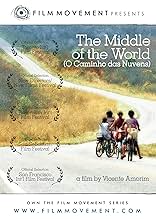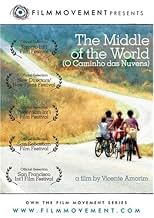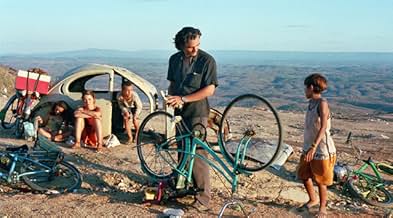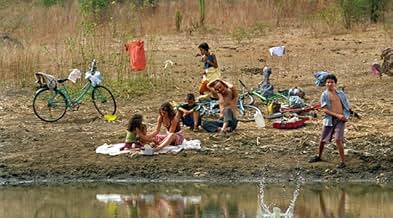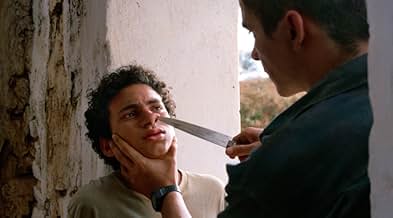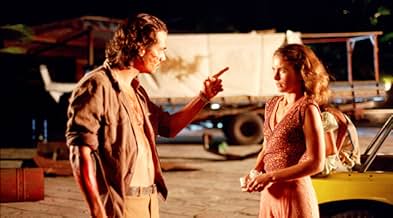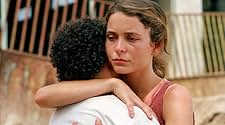VALUTAZIONE IMDb
6,5/10
1265
LA TUA VALUTAZIONE
Aggiungi una trama nella tua linguaA man and his family travel 3200km (1984 miles) by bicycle, from the State of Paraíba to Rio de Janeiro, Brazil, in search of a job.A man and his family travel 3200km (1984 miles) by bicycle, from the State of Paraíba to Rio de Janeiro, Brazil, in search of a job.A man and his family travel 3200km (1984 miles) by bicycle, from the State of Paraíba to Rio de Janeiro, Brazil, in search of a job.
- Premi
- 1 vittoria e 9 candidature totali
Manoel Sebastião Alves Filho
- Rodney
- (as Manoel Sebastião)
Felipe Newton Silva Rodrigues
- Clévis
- (as Felipe Newton)
Cícera Cristina Almino de Lima
- Suelena
- (as Cristina de Lima)
Cícero Wesley A. Ferreira
- Cícero
- (as Cicero Wallyson e Ciceero Wesley)
Alexandre Zacchia
- Porfirio
- (as Alexandre Zachia)
Recensioni in evidenza
A great Brazilian movie called "The Middle of the World", which, in fact, it is in so many ways. It is a rich but unpretentious chronicle of an extraordinary journey of one rural Brazilian family. The father is illiterate and unable to find work. Romão (the father), Rose(the mother), and their five children, from a teen to a baby, begin to make a journey on bicycles and head for Rio de Janeiro, which is 2,000 miles away, to find work. They face all kinds of physical and emotional hardships along the way, seeing many kinds of villages, dirt roads and superhighways, and desolate to spell binding scenes of nature. They beg, do odd jobs, sing in outdoor cafés for money, scrounge around in old abandoned homes, swelter under the blazing sun, almost die of thirst, and sleep under the stars; yet all the while, they keep trying to survive and maintain their love for each other, which is often tested beyond limits. The husband and wife relationship has classic features that are displayed poignantly and expertly. They exhibit a kind of yin and yang pattern with Romão being a strong, soft spoken, intensely patient, idealistic optimist and Rose being the one who verbalizes their feelings of love, sympathy, joy, as well as despair, fear, and anguish. She is also outspoken when their frailties have been overtaxed and when there is a need to be practical. Her pragmatism and his religious convictions balance each other out. Nevertheless, they are able to switch roles as the one to comfort, encourage, or recommit to the challenge when either has had enough and is losing hope and faith in their vision. With no competition from age-group peers, the character of their parents seems to be emulated as role models by the children. As a sub-plot, the teenager, Antonio, is in the middle of growing into manhood. The Father, Romão, exercises patient parental control through mild rebukes and testing Antonio's mettle by letting him use his judgment and make mistakes, but he also subtly guides him with silent looks of acknowledgement that builds Antonio's confidence in himself. Rose, the mother, gives equal guidance by emphasizing caution and protectiveness but also gives him a sense of profound mother-love that becomes his foundation of security. When the father senses Antonio is ready to emancipate, the mother does not want to let go and the father, in his wisdom-love, states simply and firmly to Rose, "We do not own our children." When Antonio is left behind to follow an occupation, the strong and positive family dynamic continues to the end of their journey. Finally, when at their destination of Rio de Janeiro, and expressing the powerful spirit of this family, their triumph is symbolized in a mountain top experience as they stand together viewing Corcovado's Statue of the Christ and overlook the prize of their victory, the city of their dreams. As they crossed the 2,000 miles of their courageous journey, they witnessed the many ways in which the nation they once knew is rapidly changing. It was a raw, earthy, beautiful story. It gave such a realistic picture of Brazil as a whole. It is a beautiful country but also has such vast differences between the rich and poor. The movie also showed what a big and truly dominant role religion, and religious superstitions, plays in the lives of the poor, illiterate 'peasants'. At 'The Middle of the World', two different worlds, the new cosmopolitan and the old world, stand on the same piece of earth!
Wonderful movie that shows the lengths many poor people must go through to eke out a living. It shows the strong bond of family, strong bond of husband and wife.
The acting and cinematography was so well, I felt like I was along with them for the ride.
The movie opens up a world many of us never see- the everyday struggle of poverty, especially with family. What would you do to feed your family? I like the way the movie shows the conflict between pride and eating.
I applaud the excellent story telling done by the director, writer, and producer.
The acting and cinematography was so well, I felt like I was along with them for the ride.
The movie opens up a world many of us never see- the everyday struggle of poverty, especially with family. What would you do to feed your family? I like the way the movie shows the conflict between pride and eating.
I applaud the excellent story telling done by the director, writer, and producer.
I've lived in Northeast Brazil, where this movie is set. Viewers get a realistic picture of small-town life, including devotion to Padre Cicero, a priest who died in 1934, in Juazeiro do Norte, Ceara. It shows the importance of the music of Roberto Carlos, the romantic singer who is Brazil's highest-selling recording artist, in the characters' lives. I've known people who have made similar journeys, and seen their devotion to their children and their struggle to preserve their dignity, just like the characters in this movie.
It's more low-key than ""Bye Bye Brasil," "Central Station," "O Auto da Compadecida," and "Eu, Tu, Eles" (Me, You, Them). It's most similar in tone to "Central Station."
It's more low-key than ""Bye Bye Brasil," "Central Station," "O Auto da Compadecida," and "Eu, Tu, Eles" (Me, You, Them). It's most similar in tone to "Central Station."
10annepg
Rarely does one have the opportunity to see such a unique, honest and beautiful movie, specially when it comes to dealing with such difficult issues such as poverty, a family's struggle to stick together and overcome all sorts of misadventures. This is a beautifully shot road movie on bicycles - based on a true story - that can be compared to The Bicycle Theif, and another Brazilian master piece by Nelson Pereira dos Santos: Vidas Secas (Barren Lives, is the English title) (based on a novel). Everyone should get to see this movie.
This is the (based on a true) story of a peasant family from northwest Brazil that migrates to Rio. They travel not how people usually do it, but as a family, on bicycles. Five children, mom and Dad, on five bicycles. Six months it takes them, and 3000 kilometers.
It's a wonderful premise for a movie, and I was disposed to like it. I've liked other films about NE Brazil. Vidas Secas by Nelson Pereira dos Santos; Me, You, Them by Andrucha Waddington; Central Station by Walter Salles. I'd like to take another look at the Glauber Rocha films if they ever become available.
But this well intentioned film just didn't make it for me. The actors were too pretty, too handsome, their teeth too perfect and white, their bodies conditioned in a gym, their faces unburnt by a lifetime in the sun. They were too clearly actors in a created scene that was too foreign to them. They just failed to meaningfully embody their characters. It felt like they were following a recipe for acting: recite lines, add so much of this or that emotion, make meaningful glances, and voila, soufflé.
In general, the "acted" scenes filmed in a studio didn't' feel right. They felt more like a mediocre made-for-TV telenovela.
The filmmakers missed the real grit of the sturm und drang of surviving on the road by your wits and your faith. Very few close-ups. The bicycles, for example: we never saw a greasy hand or a wrench or a spoke. The rich texture of the side of the road was strangely missing, such as the people who make huge pots of tripe and rice and beans and sell it to the truck drivers, half the price of restaurant food.
But the gravest mistake was the filmmakers attempt to make the picaresque, true story of a migration/pilgrimage fit into ready-made story lines, including one especially lame subplot about the coming-of-age of the oldest boy, Antonio, his conflict with the father. The eventual resolution of the conflict between father and son was downright bathetic. Saccharin-sweet sentimentality.
The scenes of Brazil were great. The roads, the berm, the sand, the daub and wattle, the life-beside-the-flow of the river/road, the landscape, the cactus, the hot dreamy little towns and villages with their brick streets and bright colors. But still, a little too pretty. I know the scene. I lived in rural northwest Brazil for 4 years and did 80,000 kilometers of traveling in Bahia. I lived in Feira de Santana for a few months, and that city is part of the movie. I love that part of the country and its people. I liked the scenes of Juazeiro.
One scene that totally failed for me was the whole "Panama" episode. It felt like it was written into the script.
The script as a whole was predictable. The attempts at character development seemed to come from the writing. Each time our travelers learn a new lesson, the filmmakers make them stand up and announce it.
The film would have worked better in documentary style, like say Slumdog Millionaire. Imagine if the filmmakers had paused a little more to explore the details of the roadside in northeast Brazil?
It's a wonderful premise for a movie, and I was disposed to like it. I've liked other films about NE Brazil. Vidas Secas by Nelson Pereira dos Santos; Me, You, Them by Andrucha Waddington; Central Station by Walter Salles. I'd like to take another look at the Glauber Rocha films if they ever become available.
But this well intentioned film just didn't make it for me. The actors were too pretty, too handsome, their teeth too perfect and white, their bodies conditioned in a gym, their faces unburnt by a lifetime in the sun. They were too clearly actors in a created scene that was too foreign to them. They just failed to meaningfully embody their characters. It felt like they were following a recipe for acting: recite lines, add so much of this or that emotion, make meaningful glances, and voila, soufflé.
In general, the "acted" scenes filmed in a studio didn't' feel right. They felt more like a mediocre made-for-TV telenovela.
The filmmakers missed the real grit of the sturm und drang of surviving on the road by your wits and your faith. Very few close-ups. The bicycles, for example: we never saw a greasy hand or a wrench or a spoke. The rich texture of the side of the road was strangely missing, such as the people who make huge pots of tripe and rice and beans and sell it to the truck drivers, half the price of restaurant food.
But the gravest mistake was the filmmakers attempt to make the picaresque, true story of a migration/pilgrimage fit into ready-made story lines, including one especially lame subplot about the coming-of-age of the oldest boy, Antonio, his conflict with the father. The eventual resolution of the conflict between father and son was downright bathetic. Saccharin-sweet sentimentality.
The scenes of Brazil were great. The roads, the berm, the sand, the daub and wattle, the life-beside-the-flow of the river/road, the landscape, the cactus, the hot dreamy little towns and villages with their brick streets and bright colors. But still, a little too pretty. I know the scene. I lived in rural northwest Brazil for 4 years and did 80,000 kilometers of traveling in Bahia. I lived in Feira de Santana for a few months, and that city is part of the movie. I love that part of the country and its people. I liked the scenes of Juazeiro.
One scene that totally failed for me was the whole "Panama" episode. It felt like it was written into the script.
The script as a whole was predictable. The attempts at character development seemed to come from the writing. Each time our travelers learn a new lesson, the filmmakers make them stand up and announce it.
The film would have worked better in documentary style, like say Slumdog Millionaire. Imagine if the filmmakers had paused a little more to explore the details of the roadside in northeast Brazil?
Lo sapevi?
- QuizCarol Castro's debut.
- ConnessioniReferenced in A Dona da História (2004)
I più visti
Accedi per valutare e creare un elenco di titoli salvati per ottenere consigli personalizzati
Dettagli
- Data di uscita
- Paese di origine
- Sito ufficiale
- Lingue
- Celebre anche come
- The Middle of the World
- Luoghi delle riprese
- Aziende produttrici
- Vedi altri crediti dell’azienda su IMDbPro
Botteghino
- Lordo in tutto il mondo
- 13.278 USD
- Tempo di esecuzione1 ora 25 minuti
- Colore
- Mix di suoni
- Proporzioni
- 1.66 : 1
Contribuisci a questa pagina
Suggerisci una modifica o aggiungi i contenuti mancanti

Divario superiore
By what name was O Caminho das Nuvens (2003) officially released in India in English?
Rispondi

